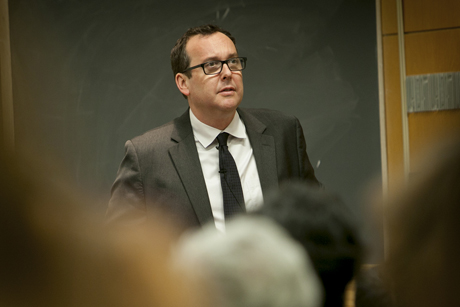To criticize is to be aware, alive, creative: A.O. Scott
By Sam Wolken

What gives A.O. Scott, chief film critic for The New York Times, the right to judge?
“We’re all naturally critics. It’s a profound and indeed a primal human activity,” Scott said, delivering the Daniel W. Kops Freedom of the Press Lecture on campus Nov. 7. “We judge; we evaluate; we rank; we compare; we praise; we find fault. But, like a lot of other natural urges, the urge to criticize carries with it a certain embarrassment.”
Scott said that criticism is a natural human impulse but acknowledged that critics are often portrayed in a negative light in his talk, “Everyone’s a Critic,” in which he also discussed the challenges and opportunities posed by the Internet for critics and the intersection between the art and the industry of criticism.
On his attitude toward the importance of criticism, Scott said: “To criticize is to be aware, to be alive, to be creative. Whatever happens, the creative urge in people is still strong and is still unconquerable. As long as it is, the critical impulse will be there right behind it and, in some ways, indistinguishable from it.”
As an example of the grievances commonly aired against critics, Scott recounted his recent feud with actor Samuel L. Jackson. Following a negative review written by Scott of Jackson’s 2012 film, “The Avengers,” Jackson posted a rebuttal on Twitter urging the film’s fans to contact Scott and suggest new careers for him. Subsequently, Scott received a litany of suggestions over the Internet comprising what Scott called “the canonical anti-critical sentiments.”
Despite the skepticism of some toward critics, the industry of criticism has shown no signs of slowing down. Innumerable critics – amateur and professional – have taken to the Internet to voice their opinions.
Of the changes the Internet has brought for critics, Scott said: “It is an unbelievably chaotic and confusing state of affairs, but it’s not actually a new state of affairs. Much of what is said about the Internet, about digital culture – its corrosive or leveling or confusing, or democratizing and liberating, effects – has already been said about print.” Scott quoted T.S. Eliot and Henry James, who voiced complaints about the number of unqualified critics finding publication in magazines and periodicals. He attributed the persistent outcry against the expansion of the critical playing field to the differences in perspective between generations.
Yet Scott spoke with optimism about the implications of the Internet for criticism. “Criticism has been, like so many other critical endeavors, liberated from the control of a few institutions and a few people, and now we have a democratic sphere of contending voices and loud arguments,” he said.
On Nov. 6 Scott visited Cornell Cinema to introduce and discuss a screening of “Sweet Smell of Success,” a 1957 film noir.
The American Studies Program sponsored Scott’s talk.
Sam Wolken ’14 is a writer intern for the Cornell Chronicle.
Media Contact
Get Cornell news delivered right to your inbox.
Subscribe